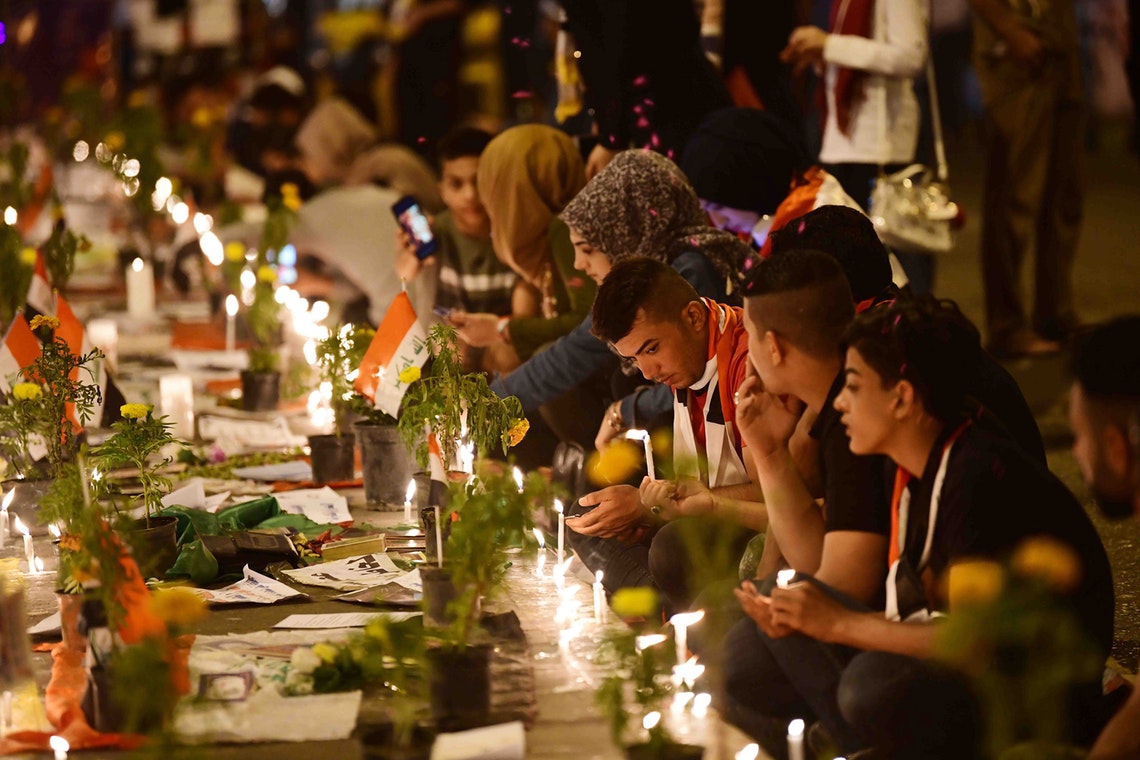In both respects, however, these observers would be wrong. The chants were a big deal. And the protests, while not entirely unprecedented, were nevertheless a sharp break from the norm. Because, for the first time in recent memory, Iraqis weren’t demanding their rights under the banner of any specific religious or ethnic group, but their rights as Iraqi citizens. And they weren’t demanding privileges—they were demanding the fall of a system that has worked to keep them apart, and that has been feeding into the pockets of corrupt elites to the detriment of ordinary citizens.
To understand why this embrace of nationality is so important, however, a look into the recent past is necessary. Under Iraq’s current model of ethno-sectarian balancing [paywall], established after the United States-led invasion of 2003, coalition governments hand out ministerial positions and budgets according to the proportion of the country’s sectarian populations—Shiite or Sunni Muslim Arabs, and Kurds. This has led to staggering corruption in which the elite’s control over government ministries, major enterprises, and media has actively worked to maintain the status quo. Spawned in the aftermath foreign occupation, this form of governance has benefitted few and served as little more than a failed attempt for perpetual ceasefire, rather than a sustainable system of government meeting the needs of the Iraqi people.
Corruption and sectarian favoritism in the public sector have played a major role in entrenching sectarian division among Iraqis and have led to rampant unemployment and lack of access to basic services. Transparency International ranks Iraq as the 18th most corrupt country in the world; according to official figures cited in a report from the Telegraph, since 2004, a remarkable $450 billion in public funds have been unaccounted for. Meanwhile, about a quarter of the country’s young population is unemployed, while access to clean water and electricity is unreliable at best.
The international community must acknowledge the magnitude of this movement and rise to its responsibility in ensuring protesters’ rights to call for a better life, and support them in their legitimate demands—but it must tread carefully. States and international groups should learn from past mistakes and refrain from throwing money at the problem or call for new elections in hopes that the country will miraculously jump to its feet and prosper. This has proven to be counterproductive or even disastrous in the past, especially in the Middle East.
What can the international community do, then? As a start, it should use its leverage with the Iraqi government to ensure an immediate halt to the slaughter of peaceful protesters. Since the movement began in October, about 400 protesters have been killed and thousands injured by government forces, and all efforts should prioritize an immediate halt to the onslaught. Further, it should pressure the government to address protesters demands and provide any support in doing so in a way that is consistent with their human rights.
This applies regardless of the resignation of Prime Minister Abdul Mahdi, since this systemic problem transcends who heads the government. The UN Secretary General has uttered harsh words at the Iraqi government’s brutality against its people, while the Arab League’s chief called for “restraint.”
Any systemic change should not be held hostage to constitutional rupture or the loss of any more lives. Change must start now in support of a transition to a new form of governance, which can then build on its own progress. The demands of protesters should be met now, and the international community has a duty to acknowledge them and support the sitting Iraqi government in adopting structural changes for a new system, regardless of who sits in in Baghdad now or in the future.
What is outlined above is necessary, but it will not sufficiently address the matter. There are too many dimensions to resolving this issue than I could possibly explain or understand. But one thing is for certain: The rage that initially drew people to Tahrir Square rapidly turned into a passionate display of popular unity that was once thought impossible, and it does not appear to be slowing down. A generation born into war and ripped apart by tragedy is now rising—and demanding recognition of their common identity.
Source


 RSS Feed
RSS Feed